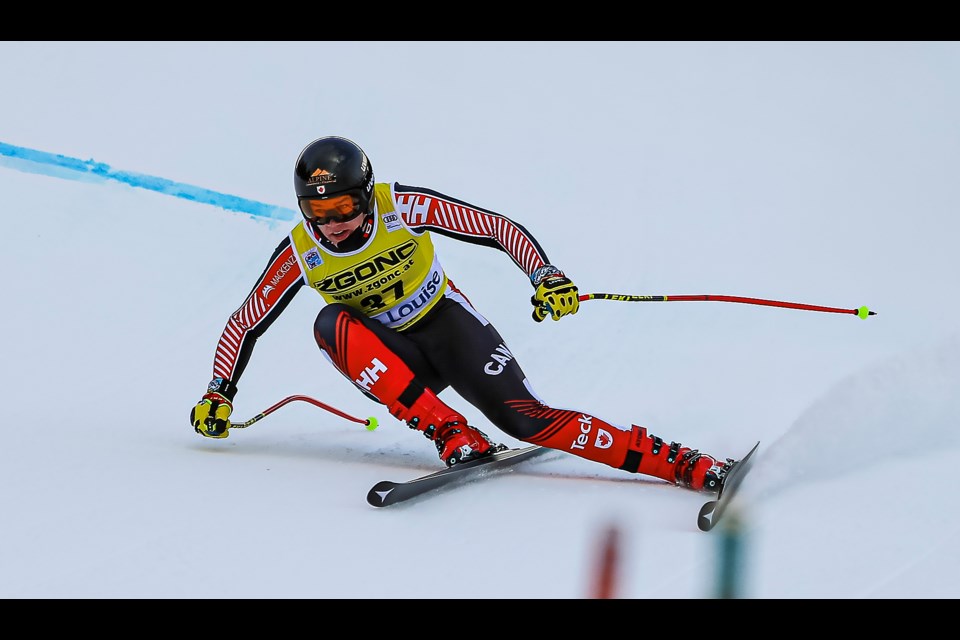CANMORE – Call it unlucky or call it strange, but the unusual start to the alpine World Cup calendar has brought on unwanted race cancellations at every turn.
The fingerprints covering the axed races are from what World Cup skiers and Canmore brothers Erik Read and Jeff Read called “extreme”, “aggressive” or downright “gnarly” weather conditions such as dangerously high winds and heavy snowfall, among others.
All five of Jeff’s men’s speed races have been cancelled so far, while half of the men’s technical races, which Erik competes in, did not happen.
Make-up races do occur and there are thoughts as to why so many cancellations have gone down. However, a couple of things they agree on is the number of race cancellations has been odd, and they’re thinking of back home during these times.
“It’s been super weird,” said Jeff, 26, a Banff Alpine Racers alum. “It’s probably the first time since I was 14 or something that I haven’t had a race until the middle of December. … It feels pretty strange to not have a taste of the start gate intensity yet.”
So far, races in Soelden, Austria, Beaver Creek, USA, and the controversial Zermatt-Cervinia in Switzerland and Italy have been cancelled on the men’s side, among others.
After two years of FIS trying to get races off the ground in Zermatt-Cervinia, it has, so far, been unsuccessful. Every World Cup race in the Swiss/Italian region has been cancelled since it was implemented two years ago – eight total.
Way up thousands of feet on a glacier and exposed, the late October and early November races have been affected by hostile weather patterns that can quickly make things unsafe for skiers.
The racing in Zermatt-Cervinia also faces controversy following reports alleging that FIS and organizing committees were bulldozing and excavating glacier ice to prep the courses for the World Cup.
After those men’s races were cancelled, an editorial on FIS’s website said snow sports are entwined with Mother Nature and that Zermatt-Cervinia has “enormous potential.”
A few days later, the scheduled women’s races there were cancelled due to strong winds.
“When we were there in Zermatt, we were wondering why are we doing something like this on a glacier when we know Lake Louise is so consistent,” said Jeff.
“I think it’s definitely a perspective to kind of wonder why we’re trying to push for races in these venues that have really unpredictable and tough weather when we took one off the calendar that is the most predictable race on the circuit throughout history.”
Last season marked the final time the World Cup will stop in Lake Louise for the foreseeable future due to financial concerns from Alpine Canada, the organizing committee that took over the event in 2022 following decades of it being run by Winterstart Events Ltd.
Considered one of the most reliable stops on the World Cup tour, the kings and queens of speed were sad to see the event in Banff National Park come to an end.
Ski conditions haven’t been great in western Canada so far due to the milder El Nino winter, but a perk of Lake Louise ski resort is it makes its own artificial snow.
“It feels like a big hole missing in the calendar,” said Jeff.
When the men’s speed races in Beaver Creek, USA, were cancelled because of wind and heavy snowfall, it stung for the Canadians and Americans due to it being their only stop in North America in 2023-24.
The US cancellations prompted Erik to take to social media, with a barbed poke that it was “too bad” Lake Louise and its “consistent early season weather” wasn’t on the World Cup calendar this year.
“At the end of the day, that’s too bad for Lake Louise and why that wasn’t able to remain on the program for the year. … One of the best things about it, it was so consistent year after year,” said Erik, a two-time Olympian.
Erik has only competed in two races this season, which started in late October. The 32-year-old finished a season-best 19th in giant slalom on Dec. 9 in Val d’Isere, France.
He said he’s dealt with the “stop and go” of the sport all his life, so it’s just part of the game. However, one thing that does stress Erik is if he’s not dialled into his equipment, which was the result of a Did Not Qualify during a mid-November slalom race in Gurgl, Austria.
“Hurry up and wait, as we say,” said Erik. "Scramble to get somewhere, scramble to get on the slope and then you're waiting for a couple hours and you get the signal to go out and you gotta ramp up and perform as best you can.”
Last season was huge for the local brothers when they won a bronze medal together at the alpine ski world championships, along with Britt Richardson of Canmore and Valerie Grenier of Ontario, in the mixed parallel team event.
Eager for more hardware, the Reads are competing in the mountains of northeastern Italy this week and next week in separate events – about 25 kilometres apart – for the men’s speed in Val Gardena and technical events in Alta Badia.
Conditions, so far, look good for both.
“It’s about time we get this world cup season going for us,” said Jeff.




